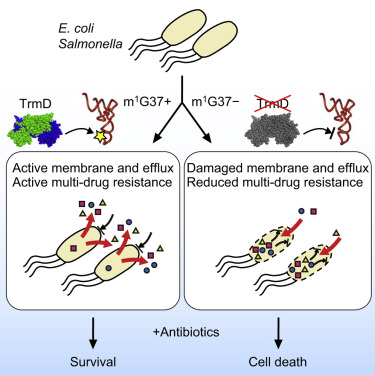Cell Systems ( IF 9.0 ) Pub Date : 2019-04-10 , DOI: 10.1016/j.cels.2019.03.008
Isao Masuda 1 , Ryuma Matsubara 1 , Thomas Christian 1 , Enrique R Rojas 2 , Srujana S Yadavalli 3 , Lisheng Zhang 4 , Mark Goulian 5 , Leonard J Foster 6 , Kerwyn Casey Huang 7 , Ya-Ming Hou 1

|
Gram-negative bacteria are intrinsically resistant to drugs because of their double-membrane envelope structure that acts as a permeability barrier and as an anchor for efflux pumps. Antibiotics are blocked and expelled from cells and cannot reach high-enough intracellular concentrations to exert a therapeutic effect. Efforts to target one membrane protein at a time have been ineffective. Here, we show that m1G37-tRNA methylation determines the synthesis of a multitude of membrane proteins via its control of translation at proline codons near the start of open reading frames. Decreases in m1G37 levels in Escherichia coli and Salmonella impair membrane structure and sensitize these bacteria to multiple classes of antibiotics, rendering them incapable of developing resistance or persistence. Codon engineering of membrane-associated genes reduces their translational dependence on m1G37 and confers resistance. These findings highlight the potential of tRNA methylation in codon-specific translation to control the development of multi-drug resistance in Gram-negative bacteria.
中文翻译:

tRNA 甲基化是细菌多重耐药性的总体决定因素。
革兰氏阴性细菌本质上对药物具有耐药性,因为它们的双膜包膜结构充当渗透性屏障和外排泵的锚。抗生素被阻断并从细胞中排出,无法达到足够高的细胞内浓度以发挥治疗作用。一次针对一种膜蛋白的努力是无效的。在这里,我们表明 m 1 G37-tRNA 甲基化通过控制开放阅读框起始处脯氨酸密码子的翻译来决定多种膜蛋白的合成。大肠杆菌和沙门氏菌中 m 1 G37 水平的降低会损害膜结构,并使这些细菌对多种抗生素敏感,从而使其无法产生耐药性或持久性。膜相关基因的密码子工程减少了它们对 m 1 G37 的翻译依赖性并赋予抗性。这些发现强调了密码子特异性翻译中 tRNA 甲基化控制革兰氏阴性细菌多药耐药性发展的潜力。

































 京公网安备 11010802027423号
京公网安备 11010802027423号